Flying could do a number on your body
Flying to your next destination might be stressful or exciting, but there are a few things that could happen to your body no matter how you feel about an upcoming trip. In the close quarters of an airline cabin, there’s the ever-present concern of exposure to viruses and bacteria that could make you sick coupled with cramped seating and extremely dry air. Here are some things that could happen to your body when you travel on a plane—and what you could do to avoid these issues.
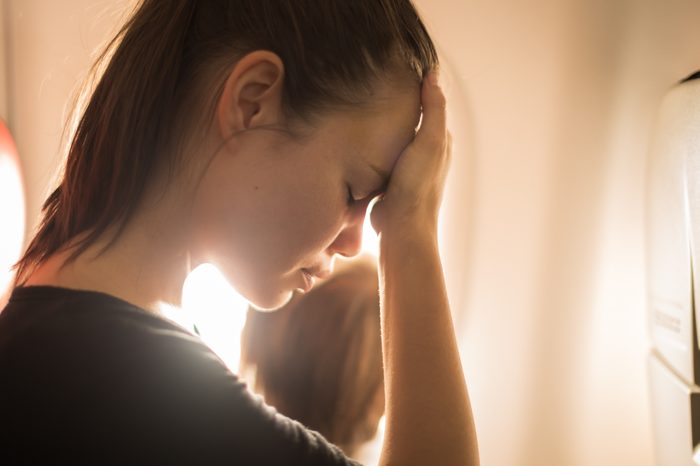
Low oxygen may make you feel sleepy or headachy
Millions of people travel by plane every single day. If you’re planning on being one of them soon, you might not be looking forward to the yucky feeling air travel often leaves you with. Besides the airport crowds and stress, traveling at such a high altitude has real effects on the body. Although the barometric pressure of the cabin is adjusted to prevent altitude sickness, you could still experience sleepiness or an airplane headache. “The lower oxygen pressure found in an aircraft cabin is equivalent to 6,000 to 8,000 feet of altitude, similar to that of Mexico City,” says Paulo M. Alves, MD, global medical director of aviation health for the medical and travel safety services company MedAire. “Oxygen partial pressure drops accordingly, creating mild hypoxia [low oxygen], which can cause headache in some susceptible individuals.” To help prevent headaches, drink plenty of water, and avoid alcohol and caffeine. (Don’t miss what doctors want you to know about normal oxygen levels.)
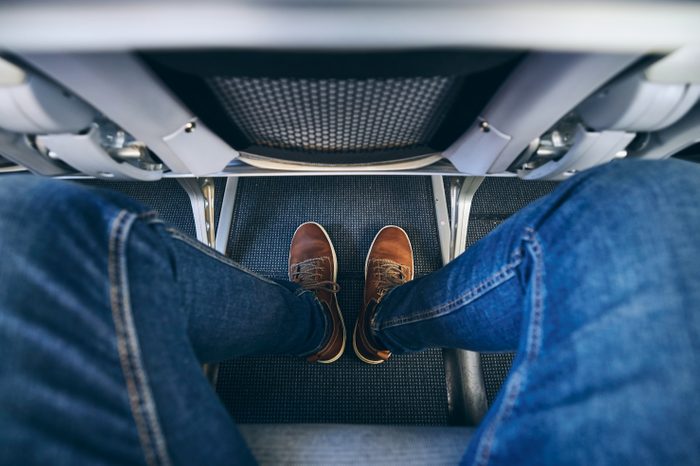
Blood collecting in your feet could make them swell—or worse
Sitting in tight quarters for hours and hours can affect blood flow throughout your body, leading to swelling in your feet and ankles. It’s also well-established that the risk of a blood clot called deep vein thrombosis (DVT) increases when blood isn’t circulating well, as happens during plane travel. “In that position, the veins in our legs are compressed and the blood flow through them is slowed down,” Dr. Alves says. Although you often hear the advice to get up and walk around, Dr. Alves says that that can cause traffic jams if too many people do it at once, and can be dangerous in the case of unexpected turbulence. “Average travelers without any risk factors would benefit from simple movements of the ankle—rotation, flexion, extension—which can be done in their own seat as frequently as possible,” he says. Risk factors for DVT include being obese, pregnant or postpartum, on birth control pills, over age 40, or having a serious medical illness. “People with underlying risk factors for DVT benefit from compression stockings, and for some at high risk, even the use of anticoagulant drugs may be indicated,” Dr. Alves says. Talk to your doctor if you have one or more risk factors and are planning a flight in the near future.
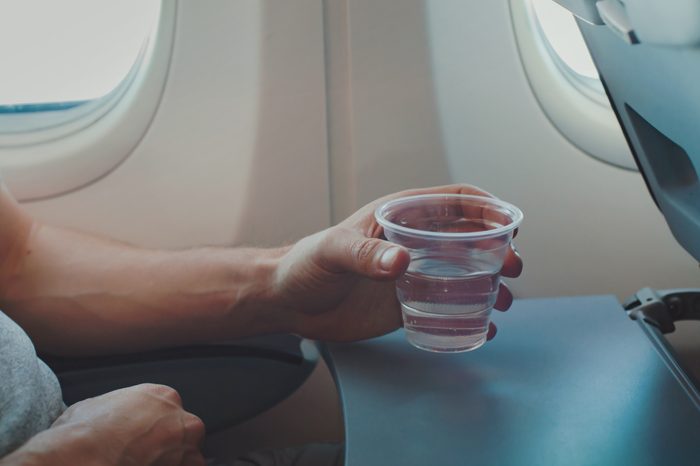
You can get dehydrated
The air you breathe in the plane cabin actually comes from outside, and air at that altitude has very little moisture. “This air is very dry, having a humidity of under 10 percent,” says Quay Snyder, MD, MSPH, president and CEO of Aviation Medicine Advisory Service. “Dehydration can lead to a feeling of fatigue, particularly when combined with the lowered pressure of cabin air. Medical conditions and some medications may exacerbate these sensations.” The best way to prevent dehydration is to drink lots of water, even before you board the plane. Bring your own water bottle so you don’t have to rely on the flight attendants to get it for you. (Just don’t refill it in the bathroom sink, where the water is non-potable.) The Aerospace Medical Association also recommends using eye drops to relieve dry eyes and consider saline nasal sprays to help dried-out nasal passages and prevent nosebleeds.
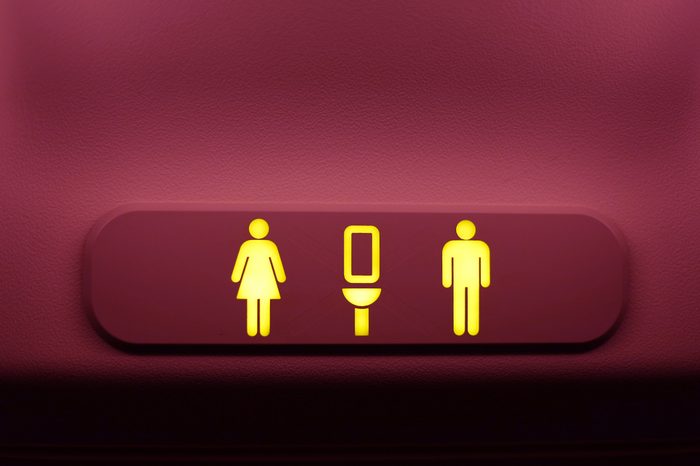
Shifts in cabin pressure make you gassy
You’re not just imagining the farting among your fellow travelers—the Aerospace Medical Association says our body’s gas can expand up to 25 percent. “We know from physics that gas tends to expand inversely to pressure,” Dr. Alves says. “Therefore, as we climb on a flight, the external pressure is progressively lower, and any gas trapped inside our body cavities will expand accordingly.” This includes the gas in your intestines, which can lead to bloating and the urge to break wind. So what should you do? Holding it in is not good for your body, so if you feel the pressure, it’s best to let it out—in the restroom if possible. (Don’t miss these other bizarre farting facts.)
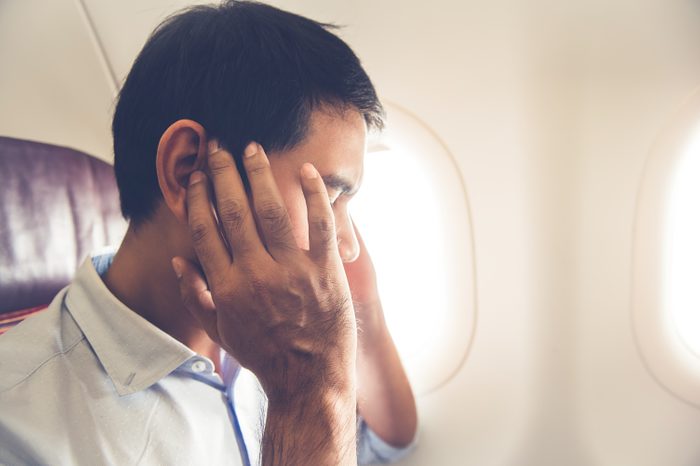
Air pressure changes cause your ears to pop
Along with an increase in gas in your intestines, your ears will likely feel the effects of shifts in air pressure. “As we ascend, gas expands, forcing the tympanic membrane to bulge outward, which gives us that well-known pressure sensation,” Dr. Alves says. “That continues until the point that the trapped air vents out through the eustachian tube into our pharynx and the ears pop back to normal.” Chewing gum is helpful for this process. The opposite happens during the descent: The air pressure expands, so more air needs to move back into the middle ear. “This is accomplished by swallowing or yawning,” he says. “Another way to do it is to gently force air out of lungs, by covering our nose and mouth so that air is forced up through the eustachian tube into the middle-ear, equalizing pressures again.” Thankfully, this temporary ear pressure won’t have any lasting damage.
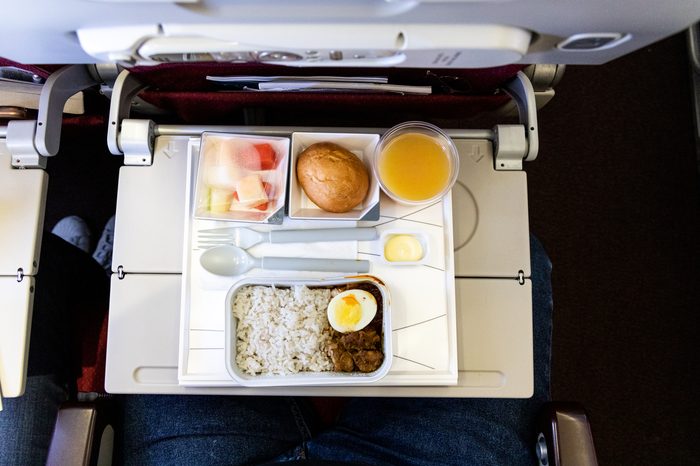
You might not taste your food
That airplane food might not really be as bland and tasteless as you think. The low-humidity air you breathe in a plane dries out the mucus membranes of your mouth and nose, which can affect your sense of taste. Some research also shows that the reduced cabin pressure and the background noise from the plane’s engines impact your ability to taste during flight, too. “A dry mouth may reduce taste sensitivity, but taste is restored with hydration,” Dr. Snyder adds. (Here are the things you shouldn’t eat on an airplane.)
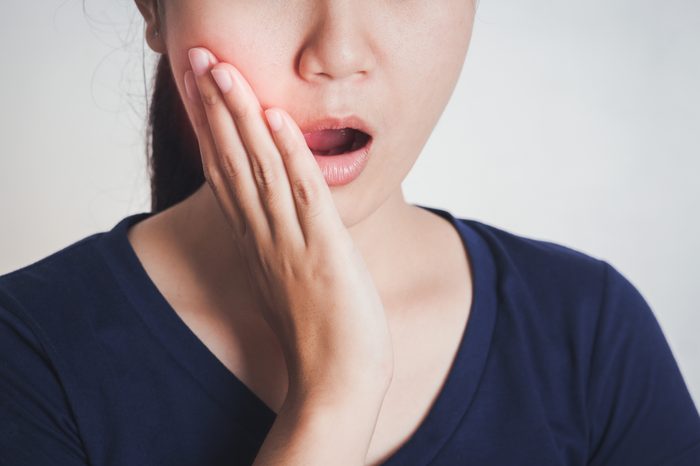
Air shifts can cause a toothache
Although less common, gas changes in our body can even affect our teeth, as gas gets trapped in fillings, cavities, or tooth-adjacent sinuses. Tooth pain thanks to changes in pressure during a flight is called barodontalgia. Unfortunately there is little that can be done to prevent this pressure. You could take painkillers like Tylenol during the flight to relieve symptoms, but if you have even a slight toothache, see your dentist before you’re scheduled to fly.
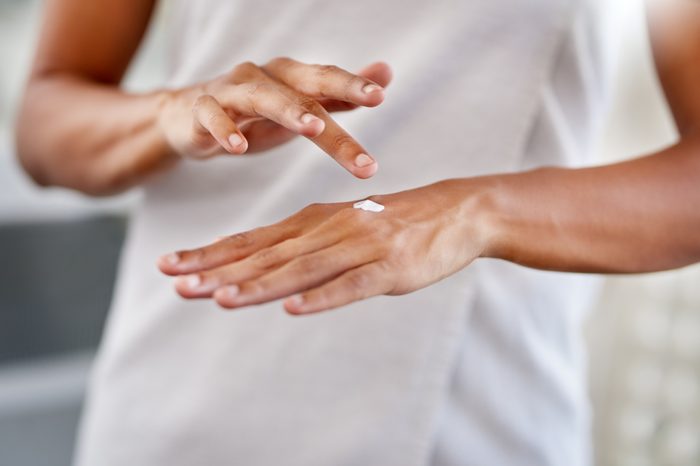
Your skin loses moisture
Another effect of airplane air is dry skin. “Dehydration can lead to dry skin and cracked lips, although most exposure on aircraft is time-limited,” Dr. Snyder says. “Moisturizing lotions prior to flying can mitigate these effects.” Keep drinking water to keep your whole body hydrated, and wash your face when you get off the plane—Rouleau says exfoliating can help get rid of the dead cell buildup from dry skin that can, ironically, lead to acne. Here are more tips for caring for your skin on an airplane.

You could develop bad breath
When your mouth dries out on an airplane, you don’t have as much saliva, which can encourage bacteria growth and lead to bad breath. If you haven’t eaten, especially if you’re not drinking lots of water, you could have a secondary bout of “morning breath” later on. Sugary drinks and fast food also don’t help the problem. “The combination of a dry mouth and not brushing teeth on long flights may contribute to bad breath,” Dr. Snyder says. You can remedy this by bringing along your toothbrush (some airlines even supply you with one) and staying hydrated.
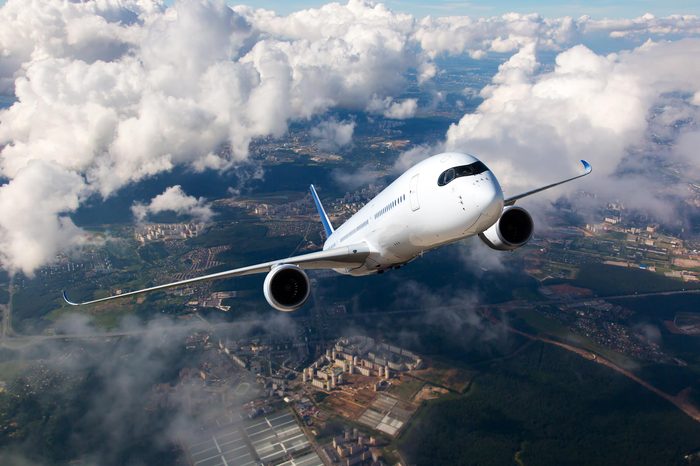
Flying long distances throws off your circadian rhythm
Your circadian rhythm is your internal clock that governs many of your body’s functions. “Hormone secretion, sleepiness, alertness, and hunger sensation, among other functions, depend on our internal clock,” Dr. Alves explains. Traveling to another time zone throws us off—that’s jet lag—and we need time to reset our clock. “The rule is that we need around one day for every hour of time zone we cross, so that means that after a six-hour transatlantic flight we would need around six days for our cycles to be fully re-synchronized with the local time,” he says. So what can you do if your trip is only a week or shorter? “On a quick turnaround business trip, it is frequently better not to try to truly adjust to a new time zone, since a full adaption would be impossible from the physiological standpoint,” he says. “On the other hand, if we want to maximize our stay on a touristic trip, it is better to try to adjust as quickly as possible, accomplished by exposing ourselves to sunlight and outdoor physical activity.” Because we are better able to adjust to a longer day instead of a shorter 0ne, flying from east to west is easier than flying west to east.
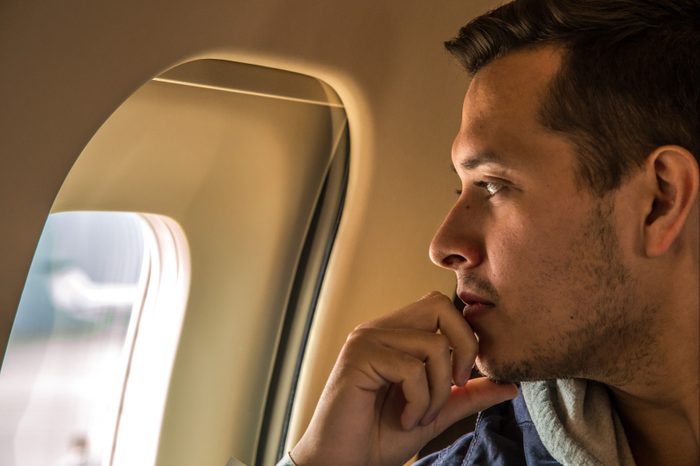
You may not actually get sick
Although airborne infections thrive in low humidity environments like airplanes, your risk of getting sick from an airplane is lower thanks to HEPA filters. “The advantage is that the air in the cabin is exchanged more frequently than in most industrial buildings, schools, or homes,” Dr. Snyder says. “This exchange rate, coupled with the filtering and circulation patterns, reduces the risk of airborne infections in aircraft from other passengers or crew compared to the non-flying environment.” Unless you’re sitting next to someone who is coughing or sneezing into your personal air space, you shouldn’t worry too much about getting sick. However, bacteria can live on cabin surfaces, so wash your hands frequently and keep them out of your eyes, ears, nose, and mouth.

